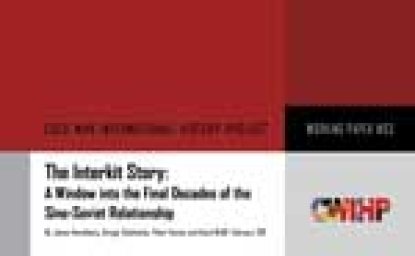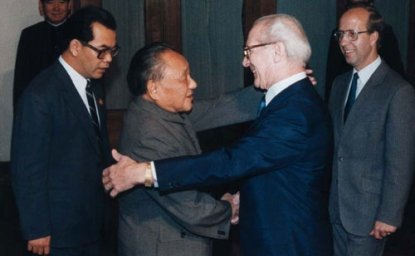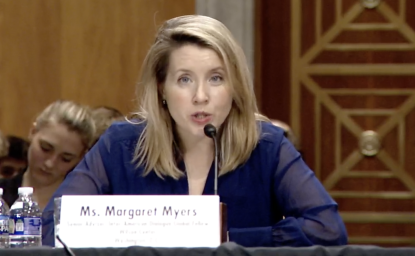China and Eastern Europe from the 1960 Moscow Conference to Khrushchev’s Removal



CWIHP e-Dossier No. 58
China and Eastern Europe from the 1960 Moscow Conference to Khrushchev's Removal
Niu Jun
The documents introduced here, obtained from the now-closed Foreign Ministry Archive in Beijing, offer Chinese perspectives on the PRC’s relations with some of the “fraternal” countries in Central and Eastern Europe from the Moscow Conference in November-December 1960 through Khrushchev’s removal from power in late 1964.
During the first half of 1960s, China’s relations with the fraternal states occupied a special position in its overall foreign relations and foreign policy. On the one hand, the countries of Central and Eastern Europe belonged to the Soviet bloc; on the other hand, they were also part of the anti-US international united front and were therefore located in what Mao Zedong called the “The Intermediate Zone” or “The Second Intermediate Zone.”[1] At the same time, however, Chinese leaders earnestly believed that most of the fraternal countries lacked independence and autonomy, and simply followed and relied upon the Soviet Union and Nikita Khrushchev.
The documents suggest that two key issues must be kept in mind when focusing on China’s relations with these fraternal states. First, during this period, Sino-Soviet relations played a decisive role in shaping China-Eastern European relations. Since 1949, China’s policy towards fraternal states had always been dependent on China’s policy towards the Soviet Union. It can even be said that Beijing viewed Central and Eastern Europe as one aspect of Sino-Soviet relations. After all, it was the Sino-Soviet alliance that determined China would join the fraternal states and become an ally of “socialist camp.” It many ways, then, it should not come as a surprise that the PRC’s relations with Eastern Europe deteriorated in the first half of 1960s as a result of the Sino-Soviet split.
The documents demonstrate that China closely observed and analyzed European countries’ attitudes and policies towards the Soviet Union. Indeed, it is quite clear that Chinese leaders delineated which countries closely followed Soviet policy and which deviated from Soviet policy (yi Su hua xian 以苏划线). For example, as China regarded Albania as its main ally against the Soviet Union, the Chinese Foreign Ministry watched how countries in Central and Eastern Europe treated Albania in order to determine whether or not they were “real Marxist-Leninists” (Document No. 19).
The role of ideology in China’s policies in the early to mid-1960s was very prominent. The documents prove that Chinese diplomats observed and interpreted Central and Eastern Europe through ideological lenses, so much so that the concepts they utilized in their internal reports were rather close to—if not exactly the same—the political terminology used in official media and propaganda. In order to understand China’s foreign policy during this period, it is important to emphasize this point.
On other hand, the fraternal states of Europe were not defined as the main enemy in the international struggle against the Soviet revisionism. While Beijing was determined to fight the Soviet Union, it chose not to pursue “direct confrontation” or to initiate debate with countries in Eastern and Central Europe, although the fraternal states were still considered to be revisionist. This principle was reflected in so-called “24-word strategy” in dealings with Poland: “If he does me no wrong, I will do him no wrong;” “If he wrongs me, I must repay him;” “Principle, benefit, moderation.” (Document No. 19)
***
Second, the documents reflect the evolution of relations between China and Eastern Europe from relaxation to deterioration during this period. This evolution kept pace with the re-radicalization of Chinese foreign policy in the early 1960s.[2]
After the November 1957 Moscow Conference, Chinese foreign policy shifted toward radicalization in a change concurrent with the “Great Leap Forward.” But because of the failure of the “Great Leap Forward,” which had serious economic repercussions for the PRC, China’s leaders had to return to a more pragmatic foreign policy, which included an improvement in relations with the fraternal states. This is also made evident in the documents; for example, in 1961 China showed a significant interest in economic cooperation with the fraternal states. (Document No. 3).
Mao Zedong, however, made a complete U-turn in China’s pragmatic foreign policy during the 10th Plenary Session of Eighth Congress of CPC in September 1962. From that time, China’s diplomacy went down the radicalization road again. It is apparent, as the documents reveal, that China’s policies towards the fraternal states shifted quite quickly along these lines. As mentioned in the Foreign Ministry’s instruction to China’s Embassy in Berlin, only “grasp the flag of harmony, while still adopting a cold attitude” (Document No. 23).
Some of the documents presented below include the contents of talks between Chinese diplomats and the leaders of some fraternal states. Although the reports of China’s embassies often expressed confidence and optimism in China’s foreign relations, it is clear that Chinese diplomats were often helpless on certain key issues. Nevertheless, they often reported that China’s leader and the Chinese Communist Party in general had great influence abroad, even claiming that some peoples privately expressed their friendship to China while dismissing Khrushchev’s policies. (A report from the embassy in Czechoslovakia described an encounter with a Presidium member: “When we shook hands, he held very tightly onto my hand” [Document No. 24].) How such optimistic and yet unrealistic reporting affected Beijing’s judgment and outlook on the world situation is worthy of further inquiry.
***
Niu Jun is Professor in School of International Studies, Peking University. He received his Ph.D. from People's University of China in 1988. He was previously Senior Fellow and Chief of Division of American Diplomacy, Institute of American Studies, Chinese Academy of Social Sciences, and Lecturer and Director of Section of Chinese Foreign Relations, Department of CCP History, The People's University of China. His major publications include From Yan’an to the World: The Origin and Development of Chinese Communist Foreign Policy, China’s Foreign Decision Making in the Cold War (in Japanese), Introduction to the Foreign Relations of PRC since 1949 (in Chinese), The Cold War and the Origins of the PRC’s Foreign Relations, 1949-1955 (in Chinese), The Cold War and Chinese Foreign Decision Making (in Chinese), and China’s Foreign Policy Analysis: Theory, History and Prospects (in Chinese).
[1] “Talk With the American Correspondent Anna Louise Strong,” August 1946, in Selected Works of Mao Tse-tung, vol. 4, (Peking: Foreign Languages Press, 1961), 97-102; “Zhongjian didai you liang ge” (“There Are Two Intermediate Zones”), September 1963, January 1964, and July 1964, in Zhonghua renmin gongheguo waijiao bu and zhonggong zhongyang wenxian yanjiushi, eds., Mao Zedong waijiao wenxuan (Beijing: Zhongyang wenxian chubanshe; Shijie zhishi chubanshe, 1994), 506-509.
According to the CCP’s leaders’ description of the world politics in 1946-1947, the “Intermediate Zone” included almost all parts of the world, with the exceptions of the United States and the Soviet Union.
The latter concept, the “Second Intermediate Zone,” emerged as Mao developed a new outlook of world politics in 964. Mao divided the previous “Intermediate Zone” into two parts—the first (the third world) and the second (Europe and Japan)—in order to develop more targeted policies for forging an international united front.
[2] For a study on China’s foreign policy during this period, see Niu Jun, “1962: The Eve of the Left Turn in China's Foreign Policy,” Cold War International History Project Working Paper 48 (October 2005).
List of Documents
Document No. 1
Cable from the Chinese Embassy in Romania, ‘Principal Differences in the Communist Movement since the Bucharest Conference and a Series of New Measures regarding Romanian-Chinese Relations,’ 13 October 1960
[Source: PRC FMA 109-01593-02, 26-29. Translated by Lu Sun.]
Document No. 2
Cable from the Chinese Embassy in Romania, ‘The Change of Romanian Attitude toward China before and after the Moscow Conference,’ 24 December 1960
[Source: PRC FMA 109-01598-02, 32-34. Translated by Lu Sun.]
Document No. 3
Cable from the Chinese Embassy in Poland, ‘A Summary of the Conversation between Ochab and Comrade Deng Gang,’ 1 February 1961
[Source: PRC FMA 109-02311-01, 1-3. Translated by Lu Sun.]
Document No. 4
Transcript of Conversation between Deputy Premier Chen Yi and Romanian Ambassador to China Barbu Zaharescu, 1 March 1961
[Source: PRC FMA 109-03794-01, 1-7. Translated by Lu Sun.]
Document No. 5
Summary of the Conversation between Comrade Peng Zhen and Romanian Ambassador in China Barbu Zaharescu, 28 March 1961
[Source: PRC FMA 109-03792-03, 6-13. Translated by Lu Sun.]
Document No. 6
Chinese Embassy in Poland, ‘Work Summary for the Chinese Embassy in Poland, 1960, and Plans for 1961,’ 14 April 1961
[Source: PRC FMA 109-01526-02, 17-30. Translated by Max Maller.]
Document No. 7
Memorandum of Conversation between Li Xiannian and Abdyl Kellezi, 14 April 1961
[Source: PRC FMA 109-02370-01, 1-5. Translated for CWIHP by Charles Kraus.]
Document No. 8
Cable from Wang Bingnan, ‘The Situation of the Talk with Ochab,’ 15 April 1961
[Source: PRC FMA 109-02311-01, 4-5. Translated by Charles Kraus.]
Document No. 9
Vice Premier Li Xiannian receives Vice Chairman of the Albanian Council of Ministers Abdyl Kelezi for a Discussion on Assistance Project, 18 April 1961
[Source: PRC FMA 109-02370-02, 7-15. Translated by Max Maller.]
Document No. 10
Vice Premier Li Xiannian Meets Czechoslovak Ambassador to China Josef Sedivy to Discuss the Issue of This Years’ Sino-Czechoslovak Trade Negotiations, 2 June 1961
[PRC FMA 109-03088-01, 43-45. Translated by Charles Kraus.]
Document No. 11
Record of a Conversation between Deputy Secretary Huang Zhen and the Polish Ambassador to China, 5 August 1961
[Source: PRC FMA 109-02308-01, 8-10. Translated by Max Maller.]
Document No. 12
Cable from the Party Committee at the Chinese Embassy in Poland, ‘Regarding the Results of Discussions related to the Situation in Poland over the Past Six Months,’ 16 August 1961
[Source: PRC FMA 109-02305-04, 16-18. Translated by Max Maller.]
Document No. 13
Cable from the Party Committee of the Chinese Embassy in Romania, ‘Summary Bulletin of Romania’s Domestic and International Policy and Sino-Romanian Relations since the Moscow Conference,’ 21 August 1961
[Source: PRC FMA 109-03791-02, 1-14. Translated by Max Maller.]
Document No. 14
Cable from the Chinese Embassy in Poland, ‘Some Noteworthy Situations from the Polish Leadership’s Open Remarks on International Issues,’ 11 October 1961
[Source: PRC FMA 109-02313-01, 1-2. Translated for CWIHP by Max Maller.]
Document No. 15
Memorandum of Conversation from the Meeting between Vice Premier Li Xiannian and the Albanian Ambassador to China Reis Malile, 12 October 1961
[Source: PRC FMA 109-02376-01, 3-7. Translated by Max Maller.]
Document No. 16
Memorandum of Conversation from the Meeting between Vice Premier Chen Yi and the Albanian Ambassador to China Reis Malile, 14 October 1961
[Source: PRC FMA 109-02376-02, 9-10. Translated by Max Maller.]
Document No. 17
Cable from the Chinese Embassy in Poland, ‘Polish Celebration of Our National Day, the Polish Communist Party’s Attitude toward China, and Our Views,’ 17 October 1961
[Source: PRC FMA 109-02311-01, 13-16. Translated by Max Maller.]
Document No. 18
Cable from the Foreign Ministry, ‘Notice regarding the Appropriate Response to the Czechoslovak Premier’s Attack on Our Party,’ 27 November 1961
[Source: PRC FMA 109-02989-05, 1-2. Translated for CWIHP by Max Maller.]
Document No. 19
Cable from the Chinese Embassy in Poland, ‘Opinions on the Ninth Congress of the Polish Party,’ 2 December 1961
[Source: PRC FMA 109-02016-01, 5-6. Translated by Max Maller.]
Document No. 20
Summary of Ambassador Wang Binnan’s Report to the Department Party Committee, 31 May 1962
[Source: PRC FMA 209-02392-01, 1-11. Translated by Max Maller.]
Document No. 21
Cable from the Chinese Embassy in Romania, ‘Some Reflections on Romania’s Approach to Combating Revisionism,’ 6 March 1963
[Source: PRC FMA 109-02666-01, 18. Translated by Max Maller.]
Document No. 22
Cable from the Chinese Embassy in Germany, ‘The Opinion of the Former First-Secretary of the German Embassy in China on Sino-German Disagreements,’ 4 April 1963
[Source: PRC FMA 109-03371-02, 22-23. Translated by Lu Sun.]
Document No. 23
Cable from the Foreign Ministry, ‘Questions regarding the the German Diplomat wanting to Establish Friendly Relations with China,’ 27 April 1963
[Source: PRC FMA 109-02574-02, 1-2. Translated by Max Maller.]
Document No. 24
Cable from the Chinese Embassy in Czechoslovakia, ‘Several Noteworthy Signs in Czechoslovakia,’ 30 April 1963
[Source: PRC FMA 109-03406-01, 1-3. Translated by Max Maller.]
Document No. 25
Cable from the Foreign Ministry, ‘Indicating the Spirit of Ambassadors’ Talks with the Romanian Side,’ 22 November 1963
[Source: PRC FMA 109-03901-01, 3-5. Translated by Max Maller.]
Document No. 26
Cable from the Chinese Embassy in Germany, ‘Brief of a Conversation with the Polish Ambassador,’ 27 November 1963
[Source: PRC FMA 109-02600-01, 21-25. Translated by Max Maller.]
Document No. 27
Record of Former Ambassador to Poland Wang Bingnan’s Conversation with Gomułka 7 April 1964
[Source: PRC FMA 109-03905-02, 10-17. Translated by Max Maller.]
Document No. 28
Cable from the Chinese Embassy in Moscow, ‘The Circumstances of Ambassador Pan’s Attendance of an Ambassador's Gathering,’ 7 May 1964
[Source: PRC FMA 109-02705-02, 124-126. Translated by Max Maller.]
Document No. 29
Cable from the Chinese Embassy in Albania to the CCPCC International Liaison Department and Ministry of Foreign Affairs, ‘Albania’s Reactions to Khrushchev’s Removal,’ 16 October 1964
[Source: PRC FMA 109-02809-01, 37-38. Translated by Xi Zhao.]
Document No. 30
Cable to the CCPCC International Liaison Department and Ministry of Foreign Affairs, ‘Reactions of Albanian Newspapers to Our Nuclear Bomb Test and Khrushchev’s Removal,’ 18 October 1964
[Source: PRC FMA 109-02809-01, 45-46. Translated by Xi Zhao.]
Document No. 31
Cable from the Chinese Embassy in Czechoslovakia to the Ministry of Foreign Affairs, ‘Our Contacts with Middle- and Lower-Level Personnel,’ 3 December 1964
[Source: PRC FMA 109-02736-03, 27-29. Translated by Xi Zhao.]
Document No. 32
Cable from the Chinese Embassy in Bulgaria, ‘Bulgaria’s New Direction after the Meeting in March,’ 15 March 1965
[Source: PRC FMA 109-02938-02, 14-16. Translated by Max Maller.]
Document No. 33
Cable from the Chinese Embassy in Bulgaria, ‘Reflections on China’s Second Nuclear Test,’ 15 May 1965
[Source: PRC FMA 109-02937-01, 60-61. Translated by Max Maller.]
Document No. 34
Cable from the Chinese Embassy in Poland to the CCPCC International Liaison Department and Ministry of Foreign Affairs, ‘A Few Polish and Czech Reactions to Our Second Nuclear Bomb Test Explosion,’ 16 May 1965
[Source: PRC FMA 109-02910-01, 19-20. Translated by Xi Zhao.]
Document No. 35
Cable from Wang Guoquan to Ministry of Foreign Affairs and Ministry of Transportation, ‘Lun-ke Talked about Issues in the International Communist Movement and the Sino-Polish Relations,’ 30 September 1965
[Source: PRC FMA 109-02910-01, 75-76. Translated by Xi Zhao.]
Author
Professor, School of International Studies, Peking University, China

Cold War International History Project
The Cold War International History Project supports the full and prompt release of historical materials by governments on all sides of the Cold War. Read more


History and Public Policy Program
A leader in making key foreign policy records accessible and fostering informed scholarship, analysis, and discussion on international affairs, past and present. Read more

Explore More
Browse Insights & Analysis
1962: The Eve of the Left Turn in China's Foreign Policy

Beyond Moscow: East German-Chinese Relations during the Cold War

